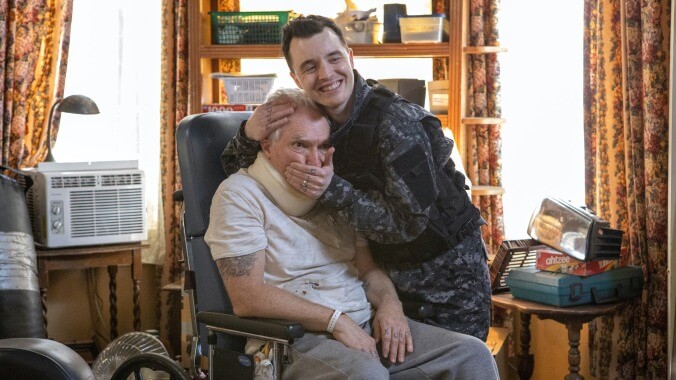Killing Terry at that point would have been perfectly acceptable as a story development. He’s a racist homophobe who was last seen before this season trying to kill his son for having the gall to be gay and get married, so his death would have been welcomed in the grand scheme of things. But the writers clearly believed that there was something else that needed to be accomplished with Terry, and so after he returned from the hospital the story shifted toward Mickey’s sense of family responsibility to the man who made his life a living hell in more ways that I have time to recount right now, which confounded me. What did the show think needed to be resolved in this story that Terry dying wouldn’t have accomplished?
It’s clear now that Terry survived for one scene in “Cancelled,” where Terry watches Mickey taking care of him and begrudgingly realizes that he’s a good son, even if he refuses to respect anything about him. And Mickey, in kind, acknowledges that if not for all the ways he was a terrible father, maybe somewhere under there he might have made it work. They share a brief moment of understanding, and Noel Fisher gets to do some actual acting for a change compared to Mickey’s usual stories, and…well, then Terry is murdered by a nun.
I understand the instinct behind the story: if Terry had simply died before Mickey had gotten even this homophobic acknowledgment that he was maybe a good person, he would have been left with unfinished business. But the problem is that because of a combination of circumstances outside of the show’s control—Fisher’s hiatus from the show—and their unwillingness to explore his story with any depth in the subsequent seasons, the idea that Mickey had unfinished business with his father or his family has no connective tissue to the rest of the series. It works in the abstract: daddy issues is, after all, the default story for every television character in history. But the script gives it no specificity: Terry is a homophobe, but the show misses an opportunity to read his past actions into the record, and to fully understand the depth of the damage he did to his son. What could have been a powerful moment for Mickey’s character arc mostly just becomes a subtle but effective moment for Fisher that fails to feed into anything beyond a “Nun killed him” punchline.
Obviously, we’re used to this from Shameless at this point. It’s been five years since the show showed a good understanding of how to make stories resonate in a meaningful way, a skill that was critical to balance the sitcom and soap elements in earlier seasons. But the closer we get to the series finale, the more frustrating it becomes. I understand why the writers have chosen to use Frank’s dementia as the trigger for the “end” of the story, and it was smart for them to seed it into the season gradually like they did. William H. Macy is a talented actor, and the way they tiered the story—beginning with small hints for the audience, then revealing for the audience, then piling up more evidence while waiting for the family to notice—was smart. It made you realize how the rest of his family are so used to dismissing Frank’s behavior that they couldn’t tell the difference, which made for a good reveal when everyone comes together at the hospital and hears his diagnosis. It was clear from the early hints that this was going to be the trigger for the season’s third act, and as much as I resent the idea of the show hinging on Frank after how pointless his character has been for years, I’ll begrudgingly acknowledge it’s the best option on the table after Fiona’s early exit.
But the problem with dragging out the reveal for a few more episodes is that it made all the other stories seem extra frivolous. Debbie’s stories are always infuriating, don’t get me wrong, but seeing her gift herself a day without responsibility by just forgetting about her daughter, getting high, and convincing a gay guy to have sex with her was especially annoying when it was clear that this was supposed to be a fun diversion before the stakes of the show escalate with Frank’s diagnosis. The same goes for Carl’s misadventure with the vice squad, where the show continues to have Carl interact with corrupt or otherwise terrible cops without ever being so bold as to suggest the institution itself is broken. And I will lose it if I go into too much detail about the absolutely inane take on cancel culture, where the show rightly paints Frank’s take on “tradition” as toxic but then decides to “both sides” it with a critique of “wokeness” that lands with a thud given its failure to acknowledge the basic principle of accountability central to the term’s original use. All of these stories were bad, but they seemed especially bad when I knew the show was on the precipice of making every character’s story more interesting by default and just twiddling its thumbs before the reveal.
Admittedly, ending a TV show is a weird narrative exercise when you think about it. There is always an inherent disconnect between how the characters see their lives and how we see them, given that we know they’re in a TV show and they’re not. (I realize this is a banal observation, but stick with me here). But I would argue that disconnect is never stronger than when a show is ending, because we have such a clear sense that we’re at the end of a journey and they don’t. Lip has every reason to believe that Brad could confess to the cops and send them all to jail, but as a viewer I feel confident that “Lip in prison” is not where they intend to leave that character. This isn’t to say that I have a clear understanding of where each character’s journey is heading, but there’s a degree of plot armor around the characters when it comes to that type of threat. Whatever bittersweet finale Shameless lands on, having Lip rotting in jail while Tami raises his son alone just doesn’t track for me, and it makes it harder for the show to tell that story without exaggerating the disconnect that’s always there.
But this is why the reveal of Frank’s dementia is such a productive development, because it serves to orient the characters with the audience: we know it’s the end of the show, but the characters simultaneously know it’s the beginning of the end for Frank, which forces each of their storylines to pivot toward the big picture of their lives and their family. Will this suddenly make me see Sandy as anything other than a short-term solution that the show never figured out how to integrate into the show for the long term? No. And do I think that Frank’s diagnosis will be a galvanizing force for Ian or Lip’s stories in a way that will render them legible connections to their larger story arcs? Not really. And do I think any of this is going to work if they were unable to make the schedule work for Emmy Rossum’s return? Absolutely not.
But William H. Macy is a great actor, and we’ve spent eleven years with these characters, and for all of the ways Shameless has made it hard to care about any of this, I do believe that there is a sunk-cost investment factor that this story will successfully activate over the course of the next four weeks. As much as I wish this final season had found a way to achieve this sooner, and across all of the show’s storylines, I’m oddly hopeful that something meaningful could come out of this final season when all is said and done, even if we haven’t seen much evidence to support it.
They’ve got four more episodes to prove me right.
Stray observations
- I’m glad Shanola Hampton got to direct Kev and Veronica’s wedding, which was sweet, but also there’s just no universe where those characters have anything approaching a meaningful story arc at the conclusion of this show, and so “randomly bringing back a story they introduced in last season’s finale and then ignored for most of the season while they ambled along as usual” is about what I’d expect. (Similarly expected: that 4K Zoom call they’re magically having on that laptop.)
- There was a meme going around on Twitter about characters who only work because of the actor playing them, and as much as Frank’s role in this show fell apart years ago, I don’t think there’s many actors other than Macy who could make me feel empathy for him after all of that garbage. Perhaps that’s where my optimism comes from: at least with Macy, I know it’s possible to tap into the well of the show’s past, even if the scripts aren’t getting us there.
- This season has made clear that while Carl’s police storyline fundamentally fails to mount a meaningful critique of policing, it is at least interested in putting the character in a positive light, teaching him what kind of cop he wants to be and anchoring his moral compass in that. And so I remain perplexed by Debbie’s storylines continuing to torpedo the character. Is there really a Shameless viewer left who is like “Lol, love it when Debbie ignores her child and cuts loose!” If this was supposed to be her rock bottom moment that makes her realize her priorities are wrong, the tone of the story failed to establish that in any way, and she remains a series-long miscalculation.
- If you, like me, were trying to place the actor playing Debbie’s coke friend Jared, he was Gael’s boyfriend on Good Trouble.
- I was reminded when Lip and Tami got horny about committing crimes together that we haven’t seen them having sex this season, which I’m guessing is some combination of COVID and the actors expressing their agency. Either way, it wasn’t shocking that we joined them post-coital, as opposed to in the act.
- For many reasons, some of which I wrote about this week, I will lose my mind if I elaborate on the dumb cancel culture storyline, but just do me a favor and don’t accept the slippery slope argument presented here as a justification for powerful people—dead or alive—avoiding consequences for their actions.
- Since we’re closing in on the end, I’m curious what your expectations are for the final episodes. What do you feel like you need to see? Is there anything you’re hoping for? Would love to hear about it in the comments.



 Keep scrolling for more great stories from A.V. Club.
Keep scrolling for more great stories from A.V. Club.